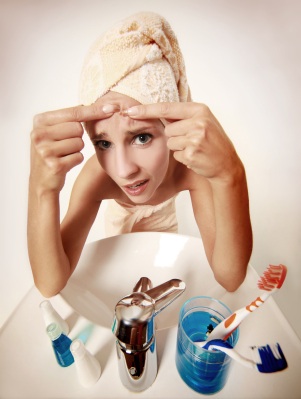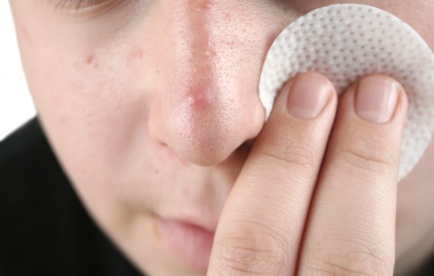Acne is a disorder that effects 80% of people between the ages of 11 and 30. This disease is caused by the overproduction of sebum in the glands beneath the skin, which in turn become irritated and create unsightly blemishes or pimples. There are many types of pimples:
- Whiteheads
- Blackheads
- Papules
- Pustules
- Nodules
- Cysts
Whiteheads are just underneath the surface of the skin while blackheads rise to the top and have a dark hue. Papules and postules are similar, both red or pink and tender. Nodules and cysts are the most serious of blemishes, and are deep within the skin and often very painful. All of these blemishes can be sensitive to light, touch or products, and are known to affect self confidence and appearance.

Other Names
Other names for acne include “breakouts”, “zits”, or “pimples.” Primarily affecting teenagers, acne can be embarrassing and hard to get rid of. Adult onset acne is becoming increasingly more common due to increased hormones in food and other outside factors.
People have been known to have acne breakouts well into their 40s or 50s, even if they did not experience acne as a teen. Acne is the most common skin disease in the world and effects people of all races and ethnicities.
Symptoms
Acne can come in many forms. Symptoms may include red and irritated bumps or blemishes, oily skin, and whiteheads or blackheads. Notoriously hard to define, this skin disease covers so many bases it is often hard to diagnose and therefore difficult to treat.
Treating Acne Problems? Get Remedies Fast!
With many causes and outward manifestations, acne is a tricky disease to monitor and should be treated under the care of a dermatologist.
Other visible symptoms include redness or swelling of the skin, round bumps protruding from underneath the skin, and excessive oil. Those with acne tend to have it mostly on their face, but some cases are severe enough that the acne spreads throughout the skin. Sometimes this means blemishes appear on the back or chest, which are particularly hard to treat.
Causes
There are many proposed causes for acne. No one knows for sure what does and doesn’t affect its rate of appearance or severity, but some things are universally agreed upon as causes.
Hormones
Secreting various levels of testosterone and estrogen, hormones are made by the large glands throughout the body. These hormones effect everyone differently, but excessive levels of some may lead to symptomatic diseases, such as acne. These hormone levels are known to fluctuate greatly during the periods of puberty and menopause in women.
Birth Control Pills
Birth control pills actively effect the levels of hormones coursing throughout the body, so beginning or stopping a regimen can adversely affect the skin and cause a woman to develop acne.
Pregnancy
Another cause of severe hormone fluctuation, pregnancy causes many women to develop blemishes or pimples due to increased levels of gender specific hormones coursing through their bodies.
Heredity: It has been shown that if your parents had acne, you are at a higher risk. This means that extra care should be taken to monitor hormone levels and keep skin thoroughly clean.
Dirty Skin
Oily or excessively dirty skin is known to cause blocked sebum glands, which in turn leads to breakouts. Some people naturally produce more oil and therefore have “dirtier” skin than others. Make-up is another source of blocked skin follicles, as is sweat.
Medicine
Some medications can alter hormone levels or lead to excess oil production, both of which may cause acne. Other prescriptions make skin more sensitive to sun or to products.
Diet and Food
While the jury is still out on whether or not ingesting food can lead to acne, some doctors believe diets high in sugary or fatty foods can lead to increased sebum production. People who drink lots of water daily tend to have less problems with acne than those who don’t.
Risk Factors
There are several factors that make people more prone to acne, including the following:
- Excessively oily skin
- Family history of acne or skin blemishes
- Hormone therapy patients or those with unstable hormone levels
- Those prone to other skin disorders like Eczema or Psoriasis
Treatment
There are many different levels of treatment available for the common form of acne. Many are over the counter but some require the help and supervision of a physician, and some even require regular blood and urine tests. The following are common acne treatment methods:
Home and Herbal Remedies
(Between $10 – $50 per month):
Face Washing
Some people’s acne can be lessened or even eliminated by better skin treatment. This means daily or bi-daily face washings with an over the counter face wash. It’s best to use a product with salycilic acid levels around 1% if your acne is serious or spreading. It is also advisable to avoid wearing heavy or oily makeup as makeup is known to clog pores.

OTC Treatment
There are numerous over-the-counter topical gels and creams available designed to spot treat acne.
These solutions can be applied directly to the affected skin, and often work best when they are allowed to sit for hours at a time.
Popular acne treatment brands include Clearasil and Neutrogena. These products can be found at grocery, drug, or discount stores.
OTC Medicines
There are several topical solutions available with high levels of benzoyl peroxide, which kills acne-causing bacteria and also sloughs off dead skin.
These medications work well for milder forms of acne, or acne that is caused by overly oily skin. One of the more popular brands of this type of product is Proactv solution.
Echhinachea and Vitamin E
Some people maintain that altering the skin’s oil levels through the intake of vitamins or herbal supplements helps or even eradicates acne. These alternative solutions should be monitored with care, and used only after careful research and a talk with a doctor.
Pharmaceutical
(Between $20 – $100 per month):
Prescription Medications
There are a variety of prescription medications available that are designed to treat the worst and most persistent forms of acne. They include:
Antibiotics
These are mainly used to treat pustules and pustules and work by killing acne-causing bacteria. This can come in pill form or intravenously in serious cases.
Retinoids
A common treatment plan, retinoids open clogged pores by dissolving the top layer of skin. They’re most commonly seen as “Retin A” and can lead to serious side effects like peeling and redness as well as birth defects if not used correctly.
Prescription Pills
The most common type of prescription acne pill is Accutane, which has proven to be a highly effective form of treatment. Blood and urine must be monitored regularly to watch for liver problems. These drugs have also been linked to increased levels of depression.
Surgeries
(Between $100 and $3,000):
Cyst Removal
Only needed in the most serious of cases, a dermatologist may be enlisted to help remove nodules or cysts from beneath the skin. These types of blemishes can be painful and dangerous if left untreated, and a doctor can remove them with minimal damage and using an outpatient procedural method.
Cortisone Injection
In the case of a sudden outbreak or particularly bad pimple, a dermatologist may choose to inject cortisone directly into the offending pustule. A short term solution that is often quite painful, this treatment works well for those with a big event to attend or with one persistent mark.
Laser Treatment
Sometimes a pulsed dye laser may be used to target the deep tissue that stimulates sebum production. This is a costly but effective method of stabilizing not only acne, but Rosacea and common wrinkles, as well. Infrared lasers are also a common laser alternative.
When Should You See a Doctor
You should seek the attention of a dermatologist in the event of the following:
- If your acne does not improve with over the counter medications or topical solutions, you may need a prescription instead.
- If scarring is seen on the skin as it can be long-term, and may also mean your acne is causing you physical pain.
- If you are a woman and in conjunction with your acne develop irregular menstrual cycles or hair in unusual places, you may have a hormonal imbalance and should see a doctor.
- If your acne worsens suddenly and/or is accompanied by a fever or swelling, you may have a serious skin infection or bacterial infection that should be treated immediately.
Prevention Tips
If you or someone you know is worried about developing acne, consider the following tips for preventing it.
Take Care of Your Skin
This means regular washings as well as careful application of lotions and topical solutions. Being too rough with your skin can also worsen breakouts, so keep washings to less than two times a day, and do not rub skin too hard when cleansing. Sports helmets, cellphones, and even hats can run skin in a way that causes increased sebum production, so be sure to wash the area that has been touched by a foreign object immediately. Clearing the skin of this excess oil can help prevent future breakouts.
Stay Out of the Sun
While the sun may temporarily dry up skin, eliminating acne momentarily, skin’s exposure to sun ultimately leads to increased sebum production, which is a cause of acne. Among the other dangers of skin damage, the sun is harmful to those taking certain acne medications.
Drink Lots of Water
A good suggestion for overall health, studies have found that those who drink upwards of 50oz. of water a day tend to have clearer skin. This may be due to a flushing effect or the effect water has on the circulation system.
Eat Fruits and Vegetables
Many produce products contain naturally beneficial vitamins and antioxidants that are known to combat acne internally. While it is not proven that fatty foods cause bad skin, it’s always a worthwhile effort to eat a healthier, more well-balanced diet.
Do Not Irritate the Skin
If you see acne of pimples appearing, do not squeeze or pop them as this may worsen them or lead to irritation. Sometimes scars are cause by overzealous cleaning or touching of skin blemishes, so try to stay hands-off.
Stay Stress Free
Stress is a known cause of acne, so employ different methods to ensure you keep your stress levels in check. This can mean talking to a friend, exercising regularly, or even meditation. Your skin will be able to feel a difference when you relieve your internal stress.
Winning the Acne War
Acne is a painful and embarrassing disease that can be treated. Contrary to popular belief, it does not solely affect teenagers and it should not go untreated. There are many different options when it comes to preventing and lessening the effects of acne, so see your dermatologist or do your research online to find out more about this disease.
As treatable as it is, there are no proven prevention methods for acne as some of its causes are beyond human control, such as heredity. Take the measures you can to keep your skin’s balance in check, but if you do happen to develop lesions or pimples, talk to a doctor to find out what the best course of treatment is for you.

No Comments